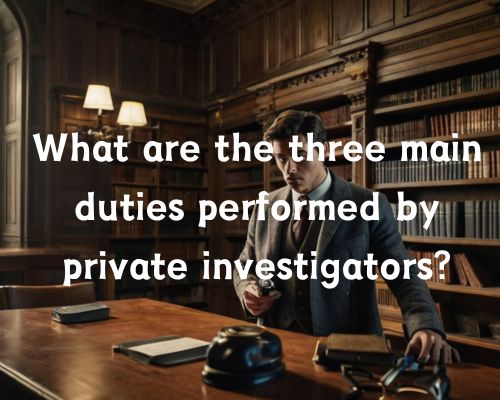
What are the Three Main Duties Performed by Private Investigators? Key Roles and Responsibilities ExplainedWhat are the Three Main Duties Performed by Private Investigators? Key Roles and Responsibilities Explained
As a private investigator, you’re entrusted with a variety of tasks that demand a unique blend of skills and expertise in criminal justice and law enforcement.
One of the primary duties performed by private investigators is conducting thorough surveillance.
This involves observing a target’s behavior from a distance to gather pertinent information without raising suspicion, often crucial in fraud and infidelity cases.

Another essential duty is performing detailed background checks.
Whether working for private citizens, attorneys, or insurance companies, you must meticulously research and compile data to provide comprehensive reports on individuals or entities.
The third main duty involves locating missing persons.
Using advanced research techniques and field investigation, private investigators like in Ali Private Investigator Tampa, are often called upon to find individuals who are difficult to trace through conventional means, providing peace of mind and critical information to clients.
Core Investigative Duties
Private investigators play a critical role in conducting investigations to uncover facts, gather evidence, and verify information for their clients.
They rely on a variety of techniques and tools, such as surveillance technology, research methods, and observation skills, to perform their duties effectively.
Conducting Surveillance
Surveillance is a fundamental duty of private investigators.
This process involves observing and documenting the activities of subjects without their knowledge.
Using tools like cameras, binoculars, and tracking devices, you monitor and record behavior to gather evidence for various cases.
Whether it’s a criminal investigation, a missing person case, or insurance fraud, your ability to stay discreet and detail-oriented is essential.
Surveillance requires patience and persistence, as you might need to follow subjects for extended periods to capture critical moments.
Gathering Evidence
Gathering evidence is another key responsibility for private investigators.
You collect data through surveillance, interviews, and research to build a comprehensive case file.
This evidence can include photographs, video recordings, documents, and digital data.
You must ensure that all collected evidence is legally obtained and meticulously documented to withstand scrutiny in court proceedings.
Your role often involves verifying the authenticity of the evidence, which can be crucial in cases such as criminal investigations and legal disputes.
Accuracy and attention to detail are paramount to ensure the information you provide is reliable and actionable.
Performing Background Checks
You perform background checks to provide clients with detailed information about individuals or entities.
This process involves researching public records, criminal records, family history, and other sources to uncover relevant details.
You might conduct background checks for various reasons, such as pre-employment screening, legal investigations, or verifying the credibility of potential business partners.
Information gathered includes criminal records, employment history, and other pertinent data.
A thorough background check helps clients make informed decisions by offering a clear view of the subject’s history and reliability.
Specialized Investigative Functions
Private investigators like in Ali Private Investigator Tampa, perform specialized functions that are crucial for various legal and personal matters.
They play an essential role in locating individuals, assisting in legal proceedings, and investigating personal matters.
Locating Individuals
One of the primary tasks of private investigators is locating individuals.
This can include finding missing persons, tracking down relatives, or identifying witnesses for a case.
Effective interviewing and strong communication skills are essential for gathering information.
Investigators may use databases, public records, and social media to aid in their searches.
They must also employ discretion and comply with legal regulations to ensure that their work is both lawful and effective.
Assisting in Legal Proceedings and Providing Testimony
Private investigators often assist attorneys and lawyers by gathering evidence and providing expert testimony in court proceedings.
This can involve conducting interviews to collect statements from witnesses or analyzing documents related to the case.
By offering detailed reports and professional insights, investigators can strengthen the legal strategy.
Their testimony can be critical, particularly when presented as expert witnesses.
It is essential that they follow legal regulations and maintain integrity throughout the process to ensure the evidence is admissible in court.
Investigating Personal Matters
Investigating personal matters is another key duty of private investigators. This can range from infidelity cases, such as investigating a cheating spouse, to more sensitive issues like child custody disputes.
Investigators must handle these matters with utmost discretion and sensitivity to protect the privacy of the individuals involved. They use various techniques, including surveillance and background checks, to gather relevant information.
This helps clients make informed decisions about their personal lives and legal actions.